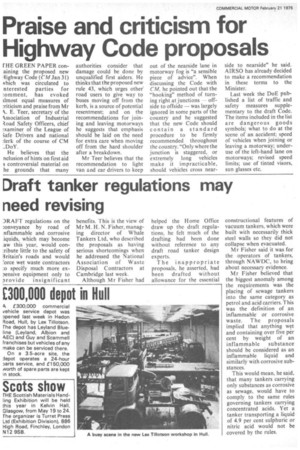Draft tanker regulations may need revising
Page 18

If you've noticed an error in this article please click here to report it so we can fix it.
)RAFT regulations on the ;onveyance by road of nflammable and corrosive iquids, which may become aw this year, would con:ribute little to the safety of 3ritain's roads and would force wet waste contractors :o specify much more exaensive equipment only to rovide insignificant benefits. This is the view of Mr M. H. N. Fisher, managing director of Whale Tankers Ltd, who described the proposals as having serious shortcomings when he addressed the National Association of Waste Disposal Contractors at Cambridge last week.
Although Mr Fisher had helped the Home Office draw up the draft regulations, he felt much of the drafting had been done without reference to any draft road tanker design experts.
The inappropriate proposals, he asserted, had been drafted without allowance for the essential constructional features of vacuum tankers, which were built with necessarily thick steel walls so they did not collapse when evacuated.
Mr Fisher said it was for the operators of tankers, through NAW DC, to bring about necessary evidence.
Mr Fisher believed that the biggest anomaly among the requirements was the placing of sewage tankers into the same category as petrol and acid carriers. This was the definition of an inflammable or corrosive waste. The proposals implied that anything wet and containing over five per cent by weight of an inflammable substance should be considered as an inflammable liquid and similarly with corrosive substances.
This would mean, he said, that many tankers carrying only substances as corrosive as sewage, would have to comply to the same rules governing tankers carrying concentrated acids. Yet a tanker transporting a liquid of 4.9 per cent sulphuric or nitric acid would not be covered by the rules.












































































































